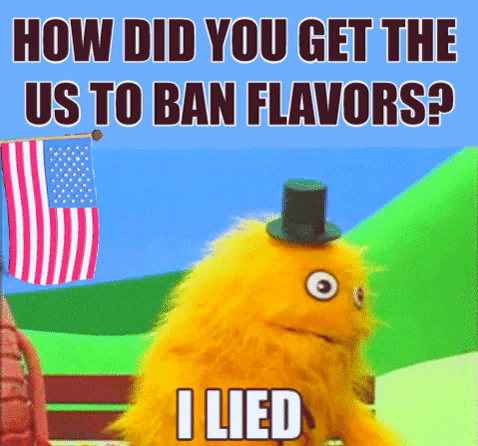Vague Warnings to Stop Vaping is Incorrect and Irresponsible

is the title of a wonderful piece written by our favorite common sense vaping advocate, Dr Michael Siegel. Dr Siegel is a Professor in the Department of Community Health Sciences at the Boston University School of Public Health, with 32 years of experience in the field of tobacco control. He previously spent two years working at the Office on Smoking and Health at CDC, where he conducted research on secondhand smoke and cigarette advertising.
If there's one guy who can be trusted as an authoritative source on eLiquids and vaping, it's this guy. The following post was taken from a recent opinion piece he has out that is making the rounds in all the magazines and online article sites, and here is the link to his wonderfully informative blog.
-------------
The United States has been dealing with an outbreak of severe, acute respiratory disease that has killed six and affected over 450 others, primarily youths and young adults. In response, the Centers for Disease Control and Prevention (CDC) is urging the public not to use electronic cigarettes. However, the vast majority of the cases have been associated not with electronic cigarettes purchased at stores, but with marijuana (THC) vaping cartridges bought on the street.
For example, as of last week, 63 of the 66 cases reported in five states (California, New Mexico, Illinois, Minnesota, and Oregon) were linked to the use of black market THC vaping products. So far not a single case has been clearly associated with the use of traditional e-cigarettes from stores, and none of the nicotine e-liquids tested by the Food and Drug Administration (FDA) were found to be contaminated.
In contrast, many THC vaping liquids have high levels of vitamin E acetate oil, which manufacturers have recently begun using as a thinning agent. The high oil content could potentially be the cause of many of the outbreak cases since the illness’ hallmark presentation is large numbers of oil droplets in lung cells.
Why is there a complete disconnect between what the CDC is telling the public and the knowledge that has been obtained from the CDC’s and FDA’s investigations? Why would the CDC protect illicit marijuana manufacturers who are responsible for the bulk of the observed cases but attack e-cigarette companies whose products do not appear to have anything to do with the outbreak?
The CDC has been attacking electronic cigarettes for several years. Despite the fact that these products have helped more than 2.5 million Americans to quit smoking and that e-cigarettes are more effective than the nicotine patch, the CDC refuses to recommend their use to smokers trying to stop. Moreover, the CDC is essentially telling ex-smokers, who have already quit by switching to e-cigarettes, that they should go back to smoking.
It appears that the CDC is intentionally taking advantage of this outbreak to further demonize e-cigarettes by hiding from the public that the widespread practice of vaping marijuana seems to be putting youth at great risk of severe lung disease.
The CDC’s response is in stark contrast to that of the FDA, which has unequivocally warned the public that “Consumers can help protect themselves by avoiding tetrahydrocannabinol (THC)-containing vapor products.”
Missing from the CDC’s advice to clinicians what they should do with every suspected case was the recommendation to conduct a urine drug screen for THC. This is the only way to accurately determine whether a patient used a THC-containing product because youth under-report their use of illicit substances purchased off the black market. This makes it impossible for the CDC to find a link to THC vape cartridges in every case, even if such a connection exists.
Instead of simply acknowledging that a large number of cases in the recent outbreak are due to black market THC vape carts, the CDC is undermining that critical information and continues to do everything it can to pin the outbreak on the use of traditional, nicotine-containing electronic cigarettes.
Hiding the fact that oil-laden THC vape carts are extremely dangerous will lead to continued use of these products by young people and result in more cases that could be prevented by simply telling the public the truth.
Moreover, the CDC’s inherent assertion that electronic cigarettes are causing these severe respiratory illnesses may lead many ex-smokers, who are currently vaping, to stop using e-cigarettes and return to smoking. There are already reports that some vapers are doing exactly that.
The CDC’s conflation of the respiratory disease outbreak and the health risks of electronic cigarettes is leading to a widespread misunderstanding of the cause of the outbreak and in turn, to irresponsible public policy.
Politicians in Michigan, New York City, New York State, and Delaware have proposed legislation to ban the sale of all flavored electronic cigarettes. And on Wednesday, the Donald J. Trump administration and the FDA commissioner announced their plan to issue a complete ban on the sale of flavored e-cigarettes throughout the country.
While they may be well-intentioned, a ban on flavored e-cigarettes would have two serious, unintended public health consequences.
First, by taking these products off the market, many ex-smokers who quit smoking by using flavored e-cigarettes will essentially be forced back to smoking. It is simply unrealistic to think that any significant proportion of these heavily addicted former smokers will be able to just wake up one day and quit nicotine use cold turkey.
Second, those former smoking vapers who do not go back to smoking will most likely turn to the black market, which will develop because it is so easy to produce do-it-yourself vaping liquids. Once these products begin to be sold off the street, consumers will truly have no idea what is in the e-liquids.
What is even more troubling about these proposed e-cigarette bans is that while they outlaw fake cigarettes, they don’t touch the real ones. It makes no sense that youth should not be able to buy an e-cigarette, but can walk into any convenience store or gas station and purchase a pack of Marlboros.
The message that people need to hear right now is that vaping marijuana cartridges purchased on the street is extremely dangerous. The vague warning to stop vaping e-cigarettes is an incorrect and irresponsible message that leads to bad public policy with devastating public health consequences.





